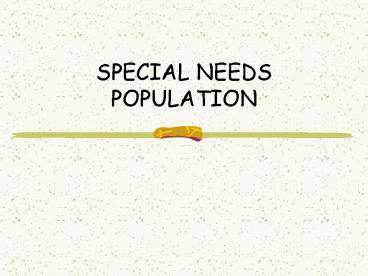SPECIAL NEEDS POPULATION - PowerPoint PPT Presentation
1 / 17
Title:
SPECIAL NEEDS POPULATION
Description:
'Public health emergency preparedness requires that state and local health ... Non-English Speaking. Serious Mental Illnesses. Disabilities. SPECIAL NEEDS POPULATION ... – PowerPoint PPT presentation
Number of Views:482
Avg rating:3.0/5.0
Title: SPECIAL NEEDS POPULATION
1
SPECIAL NEEDS POPULATION
2
DHSS GRANTS
- PUBLIC HEALTH PREPAREDNESS AND RESPONSE FOR
BIOTERRORISM - NATIONAL BIOTERRORISM HOSPITAL PREPAREDNESS
3
CROSS-CUTTING ACTIVITIES
- Public health emergency preparedness requires
that state and local health departments,hospitals,
and other health care entities be able to mount
a collective response featuring seamless
interaction of their event-specific capabilities.
4
POPULATIONS WITH SPECIAL NEEDS
- Children
- Elderly
- Minority
- Non-English Speaking
- Serious Mental Illnesses
- Disabilities
5
SPECIAL NEEDS POPULATION
- TASK FORCE
6
GOALS
- Define Special Needs Population.
- Develop a Task Force committee structure.
- Assure participation of a broad spectrum of
interested groups and individuals. - Identify special needs populations and their
disaster related needs. - Develop a comprehensive special needs population
emergency response strategic plan.
7
Special Needs PopulationDefinition
- Any individual, group, or community whose age,
physical, mental, emotional, cognitive, cultural,
ethnic, socio-economic status, language,
citizenship status, or any other circumstance
creates barriers to understanding or the ability
to act/react in the manner in which the general
population has been requested to proceed during
all phases of emergency management.
8
STEERING COMMITTEE
- Dante Gliniecki
- Jeanne Loyd
- Kathryn Hadlock
- Karen Benson
- Lynn Carter
- Gary Maddox
- Jenny Wiley
- George Turabelidze
- Gary Moll
9
COMMITTEES
- Committee I
- Age
- Physical
- Mental
- Emotional
- Cognitive
- Committee II
- Cultural
- Ethnic
- Socio-economic status
- Language
- Citizenship status
10
PEDIATRIC ADVISORY COMMITTEE
- Specific needs of children
- Operational and infrastructure issues
- Public information/risk communication strategies
- Activities integrated between public health and
hospital communities.
11
PLANNING STEPS OF ALL COMMITTEES
- IDENTIFY BARRIERS THAT PROHIBIT UNDERSTANDING OR
ABILITY TO ACT/REACT DURING AN EMERGENCY BE THEY
NATURAL, ACCIDENTAL OR INTENTIONAL. - IDENTIFY INTERVENTIONS.
- IDENTIFY RESOURCES.
- IDENTIFY ACCOUNTABILITY.
12
ACCOMPLISHMENTS
- Networking
- State Emergency Plan Annex for Special Needs
Population - Standard Operating Guides
- Local Planning Template
13
Standard Operating Guideline
- Provides guidance on how to execute the
departments roles and responsibilities for
assisting individuals with special needs during
emergency operations. - Other items considered include resource options,
contact information, command logistics,
operations MOUs.
14
DHSSStandard Operating
Guideline
- Development and Maintenance
- DHSS responsibility to develop.
- Single reference source to guide DHSS.
- Periodic reviews.
- Updates in response to
- Deficiencies identified in exercises
- Changes in local jurisdiction structure
- Technological changes
- Actual emergency operations.
15
LOCAL PLANNING
- Local Planning Template
- Resource Tool Kits
- Pediatric
- Senior/Disability
- Cultural
- Train the Trainer
- Regional Meetings
16
NEXT STEPS
- Committee(s) continue to meet
- Encourage all organizations to develop plans
- Provide consultation and educational trainings as
requested - Include the Special Needs Population in
State/local Emergency Preparedness Exercises.
17
- KATHRYN HADLOCK, R.N, B.S.N.
- Hospital Preparedness Program Manager
- MO Department of Health and Senior Services
- 1414 W. Elfindale
- Springfield, MO 65807
- Telephone 417-895-6948
- Hadlok_at_dhss.mo.gov

